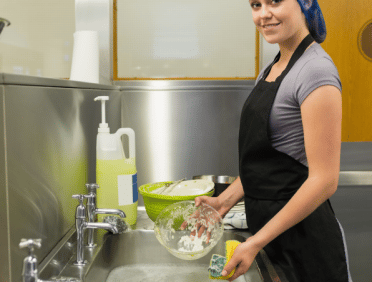Filter by
Natasha’s law is a new food labelling law that came into effect in the UK in October 2021. The law requires all food businesses, including schools, to label food with a full list of ingredients and allergens. The law was introduced following the death of Natasha Ednan-Laperouse, who suffered a fatal allergic reaction to a sandwich that did not list all of the ingredients.
For schools, this means that they must ensure that all food they serve is labelled with a full list of ingredients and allergens, including those in pre-packaged foods. Schools must also ensure that staff are trained in food allergen awareness and that appropriate measures are taken to prevent cross-contamination of allergens. Compliance with Natasha’s law is essential for protecting the health and safety of children with food allergies.
Legislative requirements for food safety can vary depending on the country and jurisdiction. In the UK, the primary legislation that regulates food safety is the Food Safety Act 1990. The act sets out the legal requirements for food businesses to ensure that the food they serve is safe to eat. The act includes requirements such as ensuring that food handlers have appropriate training, that premises and equipment are clean and maintained, and that food is stored at the correct temperatures.
In addition to the Food Safety Act 1990, there are other legislative requirements that food businesses must comply with, such as EU food hygiene regulations, local food safety regulations, and food labelling requirements.
The legal requirements for food safety vary depending on the country and jurisdiction. In general, food businesses are required to comply with food safety regulations that ensure that the food they serve is safe to eat. This includes requirements such as:
- Ensuring that food is stored, prepared, and cooked at the correct temperature.
- Keeping the premises clean and hygienic.
- Preventing cross-contamination of food.
- Ensuring that staff are trained in safe food handling practices.
- Maintaining records of food safety practices and procedures.
- Displaying a food hygiene rating if required by the local authority.
- Compliance with food safety regulations is essential for protecting the health of consumers and ensuring that food businesses operate legally and ethically.
Preparing for an Environmental Health Officer (EHO) inspection is important to ensure that your business meets the required standards for food safety. Firstly, review your food safety procedures to ensure that they are up-to-date and that you are complying with legal requirements. This can include checking that all food is stored at the correct temperatures, that you have appropriate cleaning and sanitizing procedures, and that you are following good hygiene practices.
Secondly, ensure that all staff have received appropriate training in food safety and hygiene practices. This can include training in hand hygiene, cleaning and sanitizing, and safe food handling practices.
Lastly, ensure that you have all the necessary documentation in place, such as food safety management systems and records of staff training. This will demonstrate to the EHO that you are taking food safety seriously and that you are compliant with legal requirements.
The Food Safety Act protects the consumer by setting out legal requirements for food businesses to ensure that the food they serve is safe to eat. The act covers all aspects of food safety, including the production, processing, distribution, and sale of food. It requires that businesses take all reasonable precautions to ensure that the food they serve is safe and that it meets legal requirements.
The Food Safety Act also gives the Food Standards Agency (FSA) powers to enforce food safety regulations and to take action against businesses that breach these regulations. The FSA can carry out inspections, take samples, and issue enforcement notices or prosecute businesses that do not comply with food safety regulations. This ensures that businesses take food safety seriously and that consumers can have confidence in the safety of the food they eat.
Food hygiene and safety legislation protect businesses by setting out legal requirements that businesses must follow to ensure that the food they serve is safe to eat. The legislation includes requirements such as ensuring that food handlers have appropriate training, that premises and equipment are clean and maintained, and that food is stored at the correct temperatures. By following these requirements, businesses can reduce the risk of foodborne illness and protect the health of their customers.
Compliance with food hygiene and safety legislation is not just important for protecting the health of customers; it also protects the business from legal action, financial losses, and damage to reputation. Non-compliance can result in legal action, which can be costly in terms of fines, legal fees, and compensation claims. Therefore, it is essential that businesses understand and comply with food hygiene and safety legislation.











